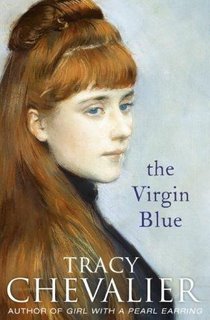Friday, September 01, 2006
First Novels, continued
 "It got a few small reviews, sold a few copies, then sank to the bottom of the pond to live with all of the other unnoticed novels." --Tracy Chevalier, on the life of her first novel, The Virgin Blue
"It got a few small reviews, sold a few copies, then sank to the bottom of the pond to live with all of the other unnoticed novels." --Tracy Chevalier, on the life of her first novel, The Virgin BlueFortunately for Chevalier, she survived on the modest notice of her first book to write her second--The Girl with the Pearl Earring, a book that attracted enough popularity and attention that it was developed into a film with Scarlett Johannson and Colin Firth. (I suppose anyone who's finally published that first novel, only to have it disappear into obscurity, can read this and take heart in the possibility that somehow, some way, a second effort will find its proper audience. Like, um, with a major film studio...)
But before that success Chevalier was only a novice novelist with glowing reviews from the Brits and scathing reviews stateside. Fortunately I'd never read those bad reviews before I got my hands on this recently republished first effort. I haven't read Girl, so the Chevalier experience was totally new to me, and I came to it with no preconceived notions.
As I've said before, I partial to historical novels, and if you can throw in a bit of romance and mystery as well, then I'm really happy. And on that score, Chevalier made me mostly happy.
The story is basically this: a 20th century American wife moves to France with her ambitious architect (also American) husband and, when they try to start a family the wife begins having powerful nightmares (which feature a distinct color of blue), she tries to overcome them by seeking out the meaning of the dreams. The search eventually uncovers secrets of her 16th century Hugeunot ancestors and undoes her marriage. Intercut with the 20th century action is the 16th century (waaay) backstory.
The problem was, once I got past the set-up, I could too easily see what Chevalier was attempting with her double cast. We are first introduced to Isabelle in her 16th century world, and then her 20th century descendent, Ella. Isabelle/Ella--get it? If you can live with that sort of obvious parallelism, then you won't be distracted by the rest of the literary doppelgangers she threads throughout the story. This can be fun for the reader, but here it seemed a little too neat.
[Warning: spoilers involved now!]
I didn't empathize with Ella, either. While her quiet war with the gossipy French villagers amused me, I couldn't accept, on any terms, her affair with the librarian. While I'm totally against adultery and acknowledge its destructiveness to all involved, sometimes I accept (note, I do not enjoy) a character's adulterous behavior because it is consistent with that character's morality. It makes a believable story. But Chevalier didn't convince me that Ella's husband was anything more than a well-meaning dolt, and we're left wondering why she married him in the first place. Because of this, the character arc of Ella falling out of one love and into another seems more like it's meant as a comment on her ancestor's marriage than her own.
But I got over all this because I really loved Isabelle, and I enjoyed Chevalier's style. It's in the 16th century that the author really gets the reader involved. Isabelle is a woman of private convictions and great personal strength, living as an outsider as the daughter-in-law of a wealthy, but not noble, Huguenot family. The virtual imprisonment Isabelle suffers in the home of her abusive husband and her suspicious, superstitious mother-in-law is enough for a reader to want to whap 20th century Ella upside the head for all her shallow grumbling about "he doesn't get me." It's a comparison that doesn't do our modern heroine any favors.
Chevalier is also much more adept at showing us complex characters, who, when faced with real persecution and oppression, make complex decisions. Her 16th century characters are all believers who mix pragmatism and politics in with their choices, allowing (as Chevalier presents it) a kind of syncretism in their daily practices that's not often recognized from our modern pulpits. But I buy it because it's human nature to mix a little bit of the old gods in with the new. The consequences for us in the 21st century are as destructive as they are in the 16th. Unfortunately Chevalier's lightweight treatment of Ella's choices is hardly worthy of her ancestor's heartbreaking sacrifices and ultimate fate.
If you'd like to chew over these ideas and you're up for a little history, a little mystery, and an introduction to Chevalier's "clean prose style," I recommend the book. For all it's faults, it's still a good tale, and if I could do this well my first time out, I'd be a happy girl.

